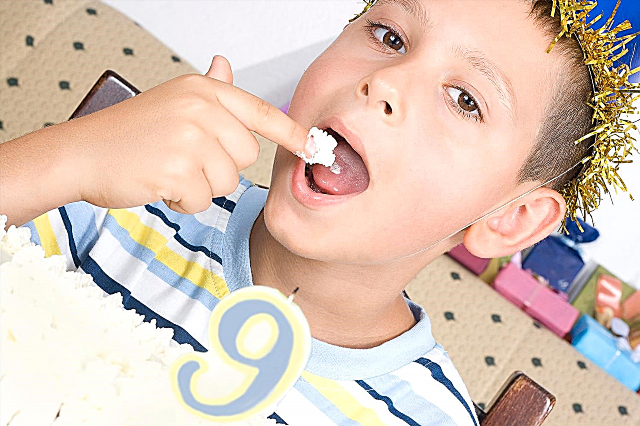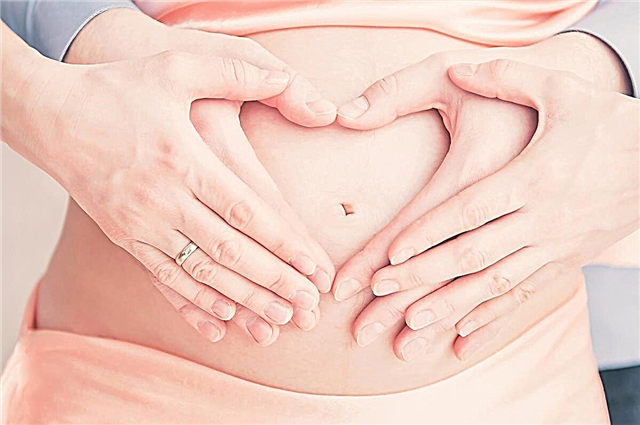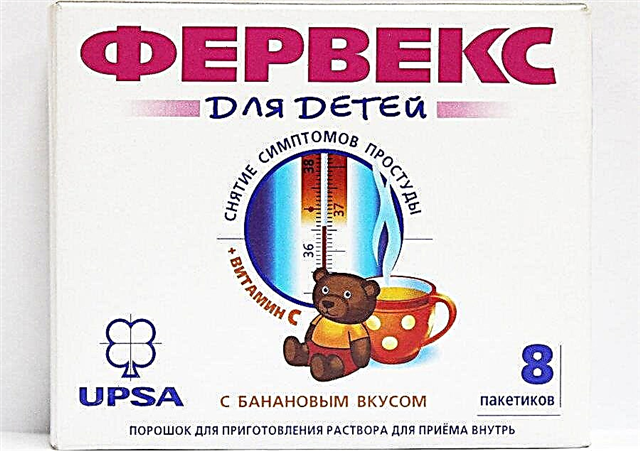After the birth, a newborn baby brings happiness to the parents, as well as a lot of pleasant efforts to care for such a fragile creature. Proper care of a newborn largely determines its healthy and full development.

Newborn - happiness for parents
Features of the development of a child at 1 month of life
Young parents should remember that all children grow and develop in different ways, according to the genes laid down by an individual schedule, however, pediatricians determine some average norms along the way.
Motor and physical development
From motor activity, the baby demonstrates sucking on the mother's breast, active movements of the limbs, flinching, touches the mouth with its fists. He learns to smile and focus his gaze.
During the first month outside the womb, the child's movement activity is uncoordinated, the muscles are in physiological tone, which is manifested in the fingers clenched in a fist and bent knees. During the first weeks, the baby learns to hold his head, his arms and back gradually get stronger.
Emotional and psychological development
The child learns to be capricious, which means the maturation of the nervous system and an overload of new information by the end of the day. At 1 month old, babies need social interaction, mainly with their mother, whose attention he attracts with loud screams and crying. By the end of 4 weeks of life, the baby can already respond with a smile in response to speech addressed to him.
Note! The constant touch of the mother's hands is of great benefit for the correct emotional and psychological development of the newborn.
Cognitive skills
The waking time of the baby gradually increases, during these hours he carefully examines the faces facing him, watches his mother, calms down from her voice. The study of the world also takes place with pens and ears. Vision is still not quite clear, objects are distinguished at a short distance, so children are more interested in bright things.
The humming begins - a harbinger of speech. Many children like to "talk" with their parents in this way. If you put a rattle in the palm of your hand, the baby instantly grabs it due to the power of a reflex, but then releases it.
Newborn care in maternity hospital
In modern maternity hospitals, mothers are constantly with their children in wards, where they also learn the main principles of caring for their newborn child in the first days of life.
Necessary things
A week before giving birth, expectant mothers collect bags for the maternity hospital, one of them with the necessary things for the child. This includes:
- clothes (undershirts, bodysuits, caps, mittens, scratches, socks, diapers), preferably 3-4 sets, so that the child is dressed in clean clothes every day, and there is a supply;
- diapers for newborns, they are the most delicate and smallest in size;
- hygiene products;
- elegant set for discharge.
Necessary manipulations before discharge
In the maternity hospital, doctors and nurses carry out the necessary care and medical procedures, and mothers study so that they can then be done independently at home.
To care for the delicate and vulnerable skin of the baby, cleanliness is important, which is maintained by the daily morning toilet, which includes:
- washing;
- care for eyes, nose, ears;
- rubbing the folds of the skin.
Manipulations are carried out on the dressing table with clean, warm hands. Also, in the maternity hospital, newborns wash for the first time, they are washed after each chair, in cold weather, many use wet wipes for babies.
From medical procedures, a newborn child in any maternity hospital undergoes treatment of the eye, navel and umbilical cord wounds, and also receives the first preventive vaccinations (on the first day of life - from hepatitis B, on the fourth - anti-tuberculosis BCG).

The umbilical cord wound is treated in the maternity hospital
Newborn care basics
During the neonatal period, the main needs of the baby are sucking, safety and sleep. They form the basis of care measures.
Bathing
The baby should be bathed every day, this is not only a hygienic procedure, but also a very pleasant way to establish a relationship between mom or dad and the child. Almost all children love water, if the baby shows anxiety, you should teach him to swim more carefully.
Important! Until the umbilical cord heals, the wound cannot be wetted while bathing; you can simply wipe the baby with a sponge.
Water is collected in the bath warm (36.6-37 degrees), the temperature is controlled with a thermometer or elbow ("grandmother's" method).
During the procedure, the child should be in his arms all the time, it should not be released for a moment. You can add non-allergenic herbs, a weak solution of potassium permanganate to the water, or use a special baby bathing product.

After bathing, the baby is blotted dry with a towel
Walking
Pediatricians (including the famous doctor Komarovsky) believe that the child needs regular daily walks in the fresh air. They have a huge positive effect on the newborn's body:
- activate blood circulation;
- improve appetite;
- promote the production of vitamin D in the sun;
- improve sleep;
- adapt the baby's body to postnatal conditions.
A young mother will also benefit from walking in the fresh air - they saturate her with oxygen, physical activity helps to restore physical shape after pregnancy and childbirth, allows you to get out of the house and improve your mood. You should walk in appropriate clothing and away from roads. Parks, waterfront embankments are best suited.
Feeding
One of the most difficult and controversial issues is infant nutrition. Almost everyone around you is ready to share recipes and tips on how to establish breastfeeding, what to eat for mom for a rush of milk, etc.
The very first food for a baby is undoubtedly breast milk. It is an ideal food that is also important for the immunity of the newborn. If for some reason the mother cannot breastfeed, the babies are fed with adapted milk formulas, now there is a huge selection of them.
Newborn babies eat about 10-12 times a day due to the small size of the stomach and the rapid absorption of mother's milk in the body. On mixtures, babies gorge themselves faster and eat a little less often. For artificial feeding, a diet (every 3 hours) is important to prevent indigestion and other problems. If the baby is breastfeeding, pediatricians and WHO recommend feeding on demand.
If the baby empties the bladder 6 to 8 times, and poops 3-4 times a day, he is completely full, calm and satisfied. If regurgitation is observed, then the child is slightly overeating.
Microclimate and atmosphere in the house
For the full development of the baby, it is not enough just to feed him and put him to bed, communication, the positive attitude of the parents, who will tenderly address the baby every time, are very important for him. Gentle conversations and pleasant music, mother's lullaby songs develop the hearing aid, strengthen the psycho-emotional background of the child.
Sleep organization
For early adaptation to the new world, better growth and development (the brain grows at this time), after birth, babies should sleep a lot and fully - this is the same basic need as food. On average, in the first months of life, children spend 14 to 20 hours a day sleeping.
However, too long a sound sleep, without awakening for food should alert parents, it may indicate some diseases. A healthy newborn needs small (up to an hour) breaks for wakefulness: eating, changing clothes, hygiene procedures and communicating with parents. As your baby grows, periods of activity increase and sleep time decreases.

Adequate sleep is very important for an infant
The correct organization of the baby's sleep is very important. About 30-40 minutes before a long night's rest, you need to dim the lights in the apartment and reduce the sound of the TV. This will be a signal to the newborn's body that night has come. Night feeding and changing diapers are best done in a dim room, do not turn on bright lights, do not amuse the child.
The best sleeping positions are on the back or on the side, you can use special positioners. It is dangerous to sleep on the stomach; a child does not need pillows for up to a year.
Exercises for child development
For modern parents, one of the important points on how to properly care for a newborn is developmental activities with a baby while he is awake.
For the development of hearing and imagination, as well as raising the mood of the mother and baby, there is nothing better than quiet songs and smooth dance movements to music. Color vision and the ability to focus on objects are well developed with large colored toys that move smoothly in front of the child's face.
After a month, children like to touch objects with different textures, this trains tactile sensations. Future speech is stimulated by finger gymnastics. One of the fun activities available to babies is looking at themselves in the mirror.
Necessary things and clothes for care
In the first months of life, the baby, in addition to clothes, needs:
- items for sleeping: crib (cradle), blanket, mattress, bed linen;
- for walks: stroller, raincoat, insect net, warm envelope in the stroller;
- for bathing and washing: a bath, hygiene products - shampoo, soap, diaper cream, as well as a soft fluffy towel;
- first aid kit recommended by a pediatrician;
- a place for changing and changing clothes - a table or a chest of drawers.

Changing table - an important piece of furniture for a nursery
The main joy for pregnant women is buying the first clothes for a little princess or prince. Newborns will need:
- slips - overalls with short and long sleeves made of thick and thin fabric;
- bodysuits - shirts fixed with buttons between the legs;

Bodysuit for baby
- caps - light and thick;
- several pairs of socks, "mittens" -anti-scratches;
- sliders;
- undershirts - sweaters with a smell;
- for winter children - a warm overalls, a hat and mittens.
For boys
Usually, clothes for newborns are not separated by gender, except that a newborn girl will most likely dress in pink and red colors, and a newborn boy in blue and blue.
Exceptions are ceremonial clothes - for boys they buy bodysuits in the form of a checkered suit with a fastener bar on the chest or even a tiny bow tie and romper pants in the form of trousers or jeans.
For girls
Mothers love to dress up little daughters in bodysuits that resemble a dress and tiny skirts, clothes for newborns are often decorated with bright, elegant details. It is important to make sure that the jewelry does not bother and cause inconvenience to the child.

Elegant bodysuit for a little princess
Daily hygiene for newborns
Young parents need to know that, due to a weak immune system, newly born babies need additional protection, which is provided by step-by-step compliance with hygiene rules. Daily procedures include washing, washing, ear, nose, and nail care.
Diaper change
The main rule is that the diaper changes as it gets dirty, but the interval should not exceed 4 hours. It should also be changed before a walk or a long night's sleep. Size should be accurate. A detailed change algorithm is as follows: after removing a dirty diaper, the contaminated areas are wiped with wet wipes, after which the skin is treated with talcum powder or a special cream under the diaper, then a fresh one is put on.
Council. If "leaks" occur, then it's time to switch to a new size.
Washing boys and girls
It is necessary to carry out this procedure in the morning, as well as after each bowel movement. In the presence of diaper rash and redness, the groin and gluteal folds are washed away more often. After the procedure, the skin is lubricated with oil or powder.
The peculiarity of intimate washing of girls is that the movements should be directed from front to back so as not to introduce bacteria into the vulva. In boys, folds in the groin areas are thoroughly washed, while the skin of the penis cannot be pushed back categorically, there cleansing occurs by itself.
Navel treatment
After about a week - 10 days, the umbilical residue disappears on its own, and until that time it must be carefully looked after. It is enough just to wipe the healing wound with a cotton swab moistened with water. The lower part of the navel is gently cleansed of dirt.
Important! For newborns, diapers with a cutout for the navel to allow air access are recommended.
Weekly newborn care
Clipping nails
Regular trimming of tiny marigolds is an important part of caring for a baby, because it prevents the baby from scratching himself and getting infections into the body. Children are not very fond of cutting their nails, so it is better to carry out manipulations during sleep, firmly pinching the baby's fingers and pushing the pads away from the nail.

Trimming marigolds
The frequency of the "manicure" - once a week, "pedicure" - once a half month.
Ear and nose care
It is enough to clean the nose as dry crusts form inside the nostrils, it is better to do this with a cotton turunda dipped in olive oil.
The child does not need to clean the nose every day, since frequent intervention can damage the structure and integrity of the nasal mucosa. The same devices clean the ears from the formed sulfur. In this case, it is necessary to clean not only the ear canal, but also the inner part of the auricle.
The appearance of a newborn in the house is accompanied by purchases of "dowry" for the baby: clothes, strollers, cots and other necessary things. In the first month of a newborn's life, the development and care of him consists in the organization of healthy sleep, proper nutrition, regular walks and daily hygiene procedures.



